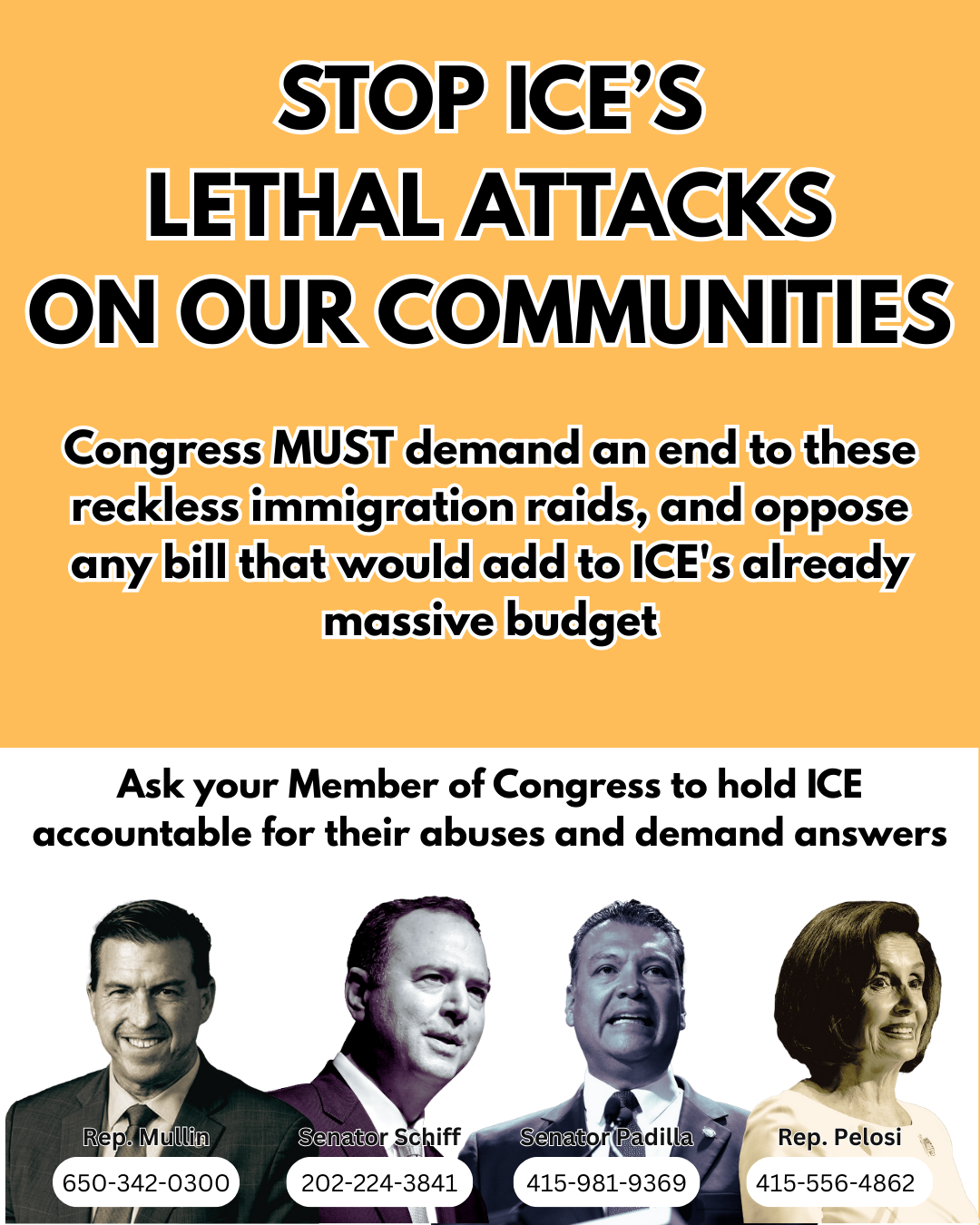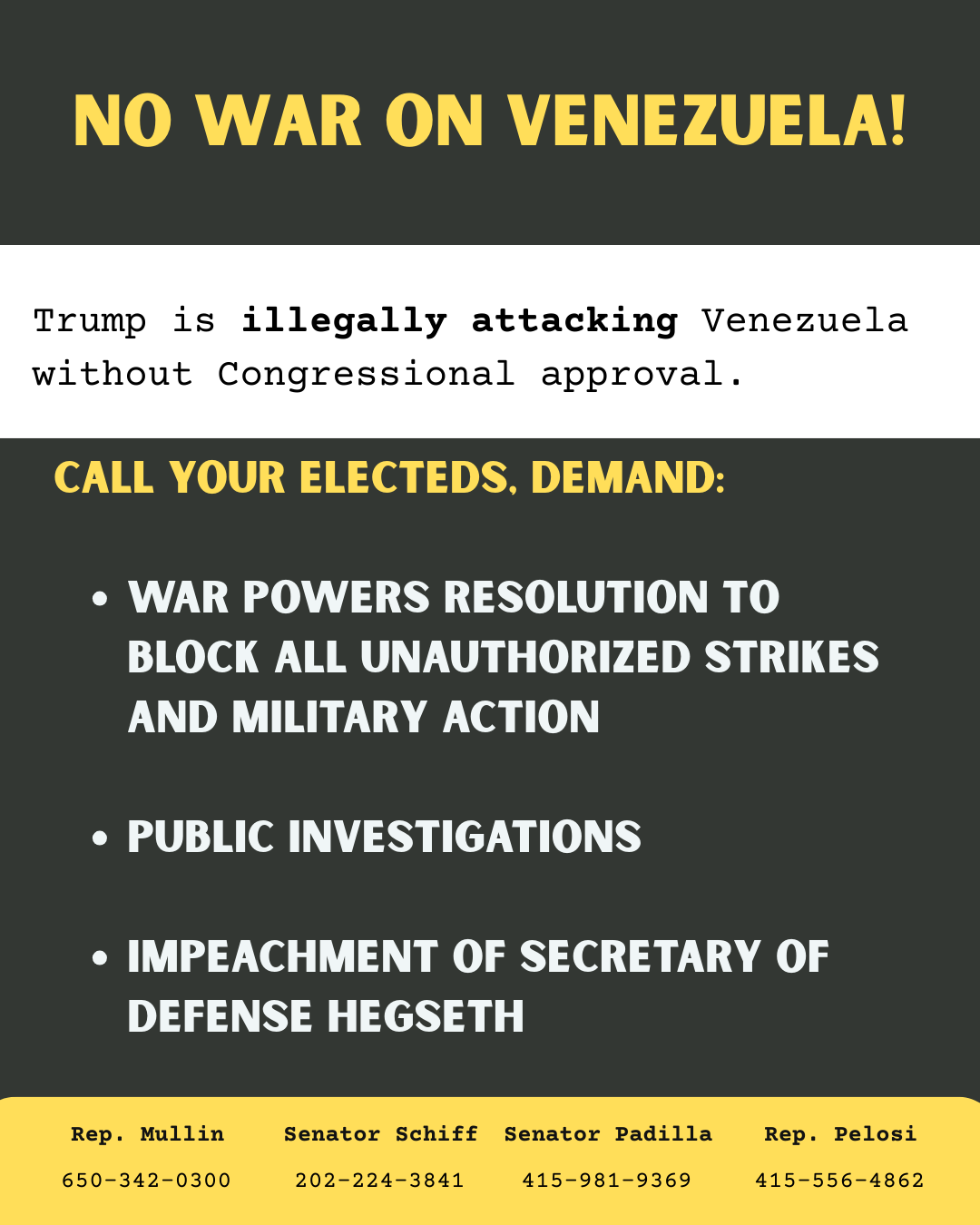Tell your Members of Congress: Support the Essential Worker Bill of Rights
Senator Dianne Feinstein
SF Office: (415) 393-0707
DC Office: (202) 224-3841
LA Office: (310) 914-7300
Fresno Office: (559) 485-7430
San Diego Office: (619) 231-9712
If you can't get through to one office, try another. There is no benefit to calling one office over another. Leaving a voicemail is as good as reaching a live person. Hate the phone? Resistbot is your friend.
Senator Kamala Harris
SF Office: (415) 981-9369
DC Office: (202) 224-3553
Sacramento Office: (916) 448-2787
LA Office: (213) 894-5000
San Diego Office: (619) 239-3884
Call the SF office first, but try the other offices if you can’t get through. If you can’t get a live person, leave a voicemail and also send a follow-up email written in your own words. Hate the phone? Resistbot is your friend.
Note: only one of the following two Congresswomen represents you. To find out which one, click here.
Speaker Nancy Pelosi
SF Office: (415) 556-4862
DC Office: (202) 225-4965
Email Contact: https://pelosi.house.gov/contact-me/email-me
Call the SF office first, but try the DC office if you can’t get through. If you get voicemail, hang up and try a few more times to talk to a real person. Don’t give up! Short direct messages are most effective. Hate the phone? Resistbot is your friend.
Rep. Jackie Speier
San Mateo Office: (650) 342-0300
DC Office: (202) 225-3531
Email Contact: https://speier.house.gov/email-jackie
Keep calling if you don’t get through. Voicemails are logged daily into a central report across offices. Hate the phone? Resistbot is your friend.
Note: Due to shelter-in-place orders during the Covid-19 emergency, it may be more effective to use email or Resistbot to contact the MoC’s office. It is important to use your own words in emails to elected officials, but feel free to use our sample script below as a guide.
Call Script
My name is __________. I am a constituent, and my zip code is _______. I am a member of Indivisible SF.
I urge the [Senator or Representative’s name] to ensure Democrats release a big, bold, comprehensive relief bill that puts people first and includes an Essential Workers Bill of Rights.
Essential workers are risking their lives at work every day to allow the rest of us to stay home. Congress must pass a bill that provides the protections they need, the rights they are entitled to, and the compensation they deserve, no matter their immigration or contractor status. These are our community and family members, and they all should be treated with respect. The impacts of this COVID-19 crisis on low-wage frontline workers and Black, Brown, Asian-American, AAPI, Indigenous, and migrant communities go even deeper. We need Congress to provide relief for the duration of the crisis and recovery for all workers and communities.
Background
Join us in partnership with Indivisible National in a day of action on the Essential Worker Bill of Rights.
Millions of essential workers across the country are rising to the challenge of the coronavirus pandemic and, unfortunately, are having to put their lives at risk to care for our communities. Essential workers from health care professionals to farm workers and grocery workers to bus drivers deserve support on the same scale they are providing to all of us. Pass an essential workers bill of rights in the next federal relief package to provide needed protections, compensation, and safety nets to all essential workers that’s inclusive of all working people, no matter their immigration or contractor status.
Essential workers are on the frontlines of this pandemic, and many are working in high-risk conditions without appropriate equipment, safety standards, or job protections. Workers who remain on the job without the ability to telework during this emergency include doctors, nurses, home care workers and other healthcare workers, grocery store and drug store employees, domestic workers, food service workers, federal, state, and municipal employees, janitorial staff, farm workers, delivery drivers, warehouse workers, transportation workers, and child care workers. These workers put their health on the line when they go to work every day.
In New York City, 41 transit workers have died as of April 8, and reports of essential worker deaths are on the rise. There are grocery workers who are denied sick leave and whose companies won’t provide masks or allow masks to be worn in stores. And health care workers including medical technicians, orderlies, EMTs, nurses, doctors, hospital employees are working long hours to save lives while their own families are on the edge of health and financial disaster.
The country has a moral responsibility to protect essential worker’s health no matter their immigration or contractor status, to create financial security for their loved ones, and to offer peace of mind during a time of heightened mortal and emotional stress. These are not only workers, but members of our communities and families. The impacts of this COVID-19 crisis on low-wage frontline workers and Black, Brown, Asian-American, AAPI, Indigenous, and migrant communities go even deeper. We need Congress to provide relief for the duration of the crisis and recovery for all workers and communities.
This includes policies like healthcare, paid sick leave, and workplace health standards to protect against more workers getting sick. We need hazard pay and childcare to properly compensate the risk workers are taking to benefit us, and enable them to keep coming to work. And we need to hold corporations who don’t follow these guidelines accountable because lives are on the line.
Congress continues to debate more relief efforts as the coronavirus pandemic deepens the health and economic crisis hitting our nation. The next bill must meet the needs of people and our communities, with an essential worker bill of rights, and not provide more corporate bailout funds. Congress should ensure that any taxpayer dollars handed to corporations go to help workers, not wealthy CEOs, rich shareholders, or the President’s cronies.
Congress should pass an Essential Workers Bill of Rights, including:
1. Health and safety protections
2. Robust premium compensation
3. Protections for collective bargaining agreements
4. Truly universal paid sick leave and family and medical leave
5. Protections for whistleblowers
6. An end to worker misclassification
7. Health care security
8. Support for child care
9. Treat workers as experts
10. Hold corporations accountable for meeting their responsibilities.







